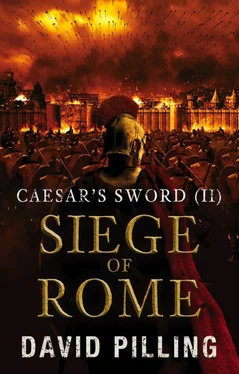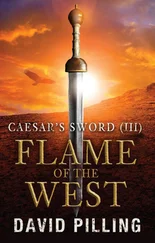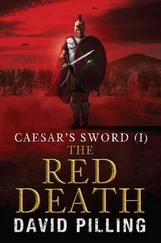Procopius was understandably frightened, even though he had some experience in this kind of secret work. The Goths and their allies were all around us, and it seemed an impossible task to pick a safe path through their teeming lines.
The guide led us half a mile beyond the gate, and then abruptly swung south, straight towards the fortified Gothic camp established to keep watch over the Appian Way. Beyond the camp lay the dark mass of the broken aqueducts that Vitiges had ordered repaired and filled with soldiers.
“Be ready to ride,” was all the guide would say. Procopius gave up trying to get anything more out of him, and the eight of us followed in silence.
The walls of Rome were to our right, illuminated by the glow of torches and braziers on the walls. I wondered if the more sharp-eyed of our sentries might see us, and prayed fervently they wouldn’t call out a challenge or raise the alarm, thinking we were a band of Goths trying to sneak into the city.
At any moment I dreaded encountering some of the mounted scouts that scoured the countryside around Rome. It was unlikely that any would be abroad at such an hour, but my fears multiplied as we plodded over the flat, open ground west of Rome. The darkness was our friend, but still I perspired freely, imagining a sudden shower of arrows and javelins, followed by hordes of Gothic pony-soldiers.
Incredibly, our little Italian guide led us safely through the enemy outposts. He knew the lay of the land intimately, and led us on clever detours, using whatever scraps of cover were available and steering clear of the scattered watch-fires.
I like to think we moved swiftly and silently, like ghosts, and we did make all speed, but were also aided by the Gothic habit of drinking themselves into a stupor. Confident after their recent victory, convinced that the Romans would not dare attempt another sally, their rough discipline had almost fallen away completely. We crept past groups of bearded soldiers singing in loud, drunken voices and downing cup after cup of their glutinous ale, when they should have been keeping watch.
We passed almost directly under the timber stockade of their camp. The sentries must have been blind, or every bit as drunk as their comrades, and we crept past unchallenged.
“The barbarians have grown complacent,” whispered Procopius, “Belisarius might ride out now, and slaughter them as they lie swine-drunk beside their fires.”
Then we came to the aqueducts. The Goths had walled up the lower arches where they met, between the Latin and Appian Ways, and stationed the majority of their garrison there. Our guide took us west, until our feet were treading the smooth, ancient flagstones of the Appian Way. In their arrogance the Goths had thought to place few pickets here, so far from Rome and deep inside their own lines.
Only once did we encounter danger. A single watch-fire burned under the crumbling ruins of an arch at the extreme western end of one of the aqueducts, warming the bones of a trio of Gothic spearmen.
They were huddled up miserably against the cold, and seemed indifferent to anything except staying close to the guttering fire. We tried to pass by too quickly, and one of them tipped up his helmet and called out a challenge.
Procopius had studied the Gothic tongue, and barked a response. The Goth didn’t seem satisfied. He rose to a sitting position, peering at us suspiciously as he clutched his spear.
“Mount,” hissed our guide. I already had one leg hooked over the saddle, and within seconds we were forcing our horses into a gallop along the highway. We kept them at a fast pace until the rugged silhouette of the aqueducts were a distant line on the horizon. There was no pursuit: either the sentry failed to raise the alarm, or his superiors failed to heed him.
Naples was almost two days’ ride away. We covered a portion of the distance that night, and rested at dawn, sinking to sleep inside a little grove just as the sun broke cover in the east.
We were inside the borders of Campania, and practically clear of danger, for the Goths had concentrated their forces around Rome and in the north of Italy. Thanks to the earlier conquests of Belisarius, Campania was imperial territory, and would remain so unless Rome fell and Vitiges could push his armies south.
Dusk of the second days’ ride brought us within sight of the walls of Naples again, and the blue sparking waters of the bay.
Procopius was the first to spur his horse onto a ridge overlooking the city. He reined in and shaded his eyes, looking out to sea, and gave an excited yelp.
“Coel!” he shouted, beckoning at me. I rode up to join him, and looked down at the glorious spread of the city, white walls shining in the late afternoon sun, and the broad waters of the ocean beyond.
The sea was full of ships, bobbing at anchor in the bay. Transports, galleys and dromons, all with imperial flags fluttering from their mast-heads.
Every ship was packed with soldiers. The Emperor had not forgotten us after all, and sent thousands of troops to our aid.












